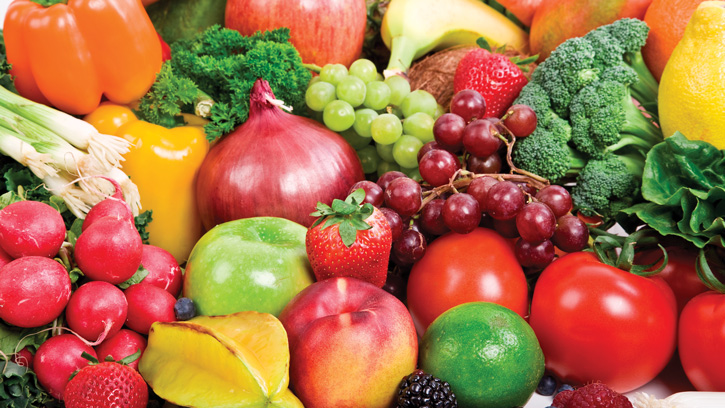Fruits and veggies help stave off dementia; Healthy trends drive beverage sales
NEWS
Fruits, veggies help stave off dementia
A recent study from Rush University Medical Center in Chicago offers further proof of the benefits of fruits and vegetables, namely, that they may contribute to better cognitive health as people age. The study results, published in Neurology, indicate that diets rich in flavonols—found in nearly all fruits and vegetables as well as tea and wine—may reduce an individual’s risk for developing Alzheimer’s.
Flavonols are a class of flavonoids, a group of phytonutrients with powerful antioxidant and anti-inflammatory properties. During the study of 921 individuals with an average age of 81, those who consumed the highest level of flavonols were 48% less likely to develop Alzheimer’s than those with the lowest level.
Study author Thomas M. Holland broke down flavonols into four types: isorhamnetin, commonly found in pears, olive oil, wine, and tomato sauce; kaempferol, found in kale, beans, tea, spinach, and broccoli; myricetin, found in tea, wine, kale, oranges, and tomatoes; and quercetin, found in tomatoes, kale, apples, and tea.
After following the eating habits of participants for an average of six years, the researchers found that individuals with a high intake of isorhamnetin or myricetin were 38% less likely to develop Alzheimer’s while those with a high intake of kaempferol were 51% less likely to develop the disease. Quercetin was not tied to a lower risk of dementia.
Although additional research is needed to confirm the results, Holland found them promising. “Eating more fruits and vegetables and drinking more tea could be a fairly inexpensive and easy way for people to help stave off Alzheimer’s dementia,” he observed, in a press release.
Fast food ranks No. 6 in brand intimacy
In a study of brand intimacy—a measure of the bond consumers form with brands—marketing agency MBLM ranked the fast food industry sixth out of 15 industries studied. Starbucks took the No. 1 spot, followed by Chick-fil-A, McDonald’s, Dunkin’, Subway, Wendy’s, KFC, Taco Bell, Domino’s, and Pizza Hut.
Among the 6,200 consumers who took part in the survey, Starbucks was ranked the top intimate brand by men, while Chick-fil-A was the leading pick among women. For consumers with incomes under $100,000, Chick-fil-A was the top-chosen brand, while KFC was preferred by those with incomes over $100,000. The most prominent archetype in the category was indulgence, with Starbucks rated the top performer.
MLBM also looked at the effects the pandemic has had on consumers’ perceptions of fast food brands and found that Starbucks’ customers demonstrated a great deal of emotion for the brand while consumers of Chick-fil-A noted the company’s service and reliability. McDonald’s customers, on the other hand, viewed the brand as a corporation that cared about profits and did not protect employees. Dunkin’ customers commented on their devotion to the brand, appreciation of local franchises, and Dunkin’s active hiring practices. Mixed reviews characterized consumer mentions of Subway, with some associating it with financial trouble but also highlighting the brand’s donations to medical workers.
MBLM concluded that consumers are likely to deepen their emotional attachments in the fast food space as brands evolve their product offerings and provide the indulgence many consumers crave.
Genetic factors and fatty food liking
Results of a research study led by the Monell Chemical Senses Center indicate that a person’s liking of fatty food may be related to inborn genetic traits.
“Person-to-person diversity in the positive perception of fattiness derives partially from an individual’s genetic make-up,” explained senior author Danielle Reed, in a press release. “How the taste, smell, and flavor of food and drink affect liking, and therefore the amount and type of food consumed, ultimately affects human health.”
The study tested perception and liking of low- and high-fat potato chips among identical and fraternal twins. Participants’ DNA was also extracted, so the scientists could determine the individuals’ genotype at hundreds of thousands of locations in their genome.
Results revealed a more similar pattern of liking for identical twins as compared with fraternal twins. The researchers also compared taste-test results from other pairs of twins with a similar genotype and found two gene variants that correlated with the twins’ ratings of liking, neither of which had previously been associated with fattiness perception.
Next steps include testing people around the globe and with different types of fat in a variety of foods, such as pizza, muffins, and ice cream.
Healthy trends drive beverage sales
A new report from Packaged Facts forecasts an increase in sales for major beverage categories as consumers shift spending from restaurants to at-home consumption. By building on gains on the retail side, beverage manufacturers are predicted to increase sales from $150 billion in 2019 to more than $160 billion by the end of 2020, according to the report, which further predicts a jump in sales to $170 billion by 2024.
Three health-focused beverage trends are expected to help drive sales:
• plant-based, which appeals to flexitarians and those who view plant-based food as more environmentally sustainable;
• reduced sugar and calories, which is being propelled by public health recommendations and tax legislations; and
• functional ingredients that boost immunity and promote wellness, including antioxidants, adaptogens, vitamins, probiotics, Coenzyme Q10, and branched-chain amino acids (BCAAs).
FDA unveils new approach to safety
With a focus on creating “concrete and essential action plans,” Stephen M. Hahn, commissioner for the U.S. Food and Drug Administration (FDA), recently unveiled the agency’s New Era of Smarter Food Safety blueprint.
The New Era of Smarter Food Safety represents a fresh approach to food safety, one that leverages technology and other tools to create a safer and more digital, traceable food system using simple but more effective approaches and processes.
The blueprint outlines the work the FDA plans to undertake over the next decade to update its food safety approaches and bend the curve of foodborne illness. It includes work to enhance traceability, improve predictive analytics, respond more rapidly to outbreaks, address new business models, reduce contamination of food, and foster the development of stronger food safety cultures.
The document also outlines a partnership among government, industry, and public health advocates based on a commitment to create a more modern approach to food safety. The challenges that have arisen during the COVID-19 pandemic have accelerated the need for actions called for in the blueprint, especially in times of crisis. (See article on page 58 for a discussion of the new blueprint by Frank Yiannas, FDA deputy commissioner for food policy and response.)
News Bites
• BENEO announced plans to add a line to its facility in Wijgmaal, Belgium, to increase production of rice starch by 50%. The two-stage investment, valued at $56 million, will conclude in March 2022.
• Better Juice announced plans to scale up its patent-pending technology to reduce sugars in orange juice. The startup is installing a semi-industrial pilot plant that will be available for future testing at global partners’ plants.
• Home Chef announced a collaboration with Impossible Foods, whereby Home Chef will offer recipes that allow customers to swap animal-based proteins for the Impossible Burger as part of its “Customize It” feature.
• Ingredion completed the expansion of its rice manufacturing facility in Banglen, Thailand, as part of its ongoing strategy to support customers globally through the growth of its specialty food ingredients business.
• Vertical farming company Kalera announced plans to open a state-of-the-art growing facility in Houston in the spring of 2021. The new facility is expected to be the largest vertical farming facility in Texas.
• Land O’Lakes and Microsoft have teamed up on a multi-year partnership that will leverage each company’s expertise to pioneer new innovations for food production, enhancing traceability, expanding on-farm sustainability practices, and helping to bring better broadband infrastructure to America’s rural areas.
• Motif FoodWorks announced partnerships with the University of Illinois at Chicago and the University of Illinois at Urbana-Champaign to better understand and design the rheological properties of plant-based foods.
• Nespresso has announced an investment of CHF 160 million to expand its Romont production center in Switzerland to meet increasing consumer demand for its premium coffees and support international development in the coming years.
• Nestlé Purina announced the expansion of its operations in Cumberland County, Pa., hiring additional employees and adding new processing and packaging lines to its Mechanicsburg location.
• Olde Thompson, a California-based provider of private label and branded spices and seasonings, has acquired Gel Spice, a family-owned, New Jersey-based importer and manufacturer of spices, seasoning, and bakery ingredients to the retail and foodservice channels.
• Omya has rebuilt and expanded its calcium carbonate production plant in Orgon, France, adding substantially higher capacity for its functionalized calcium carbonate product platform, a new packaging line, and an on-site warehouse.
• Sabert Corp., a global manufacturer of food packaging products and solutions, announced the launch of its new product line, the Kraft Collection, which consists of an array of corrugated and paperboard food packaging solutions made with materials that are recyclable, compostable, and contain post-consumer fiber content.
• Unilever announced plans to place the majority of its tea business into a separate entity while retaining its tea business in India and Indonesia.






